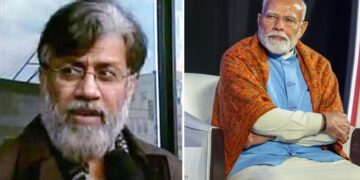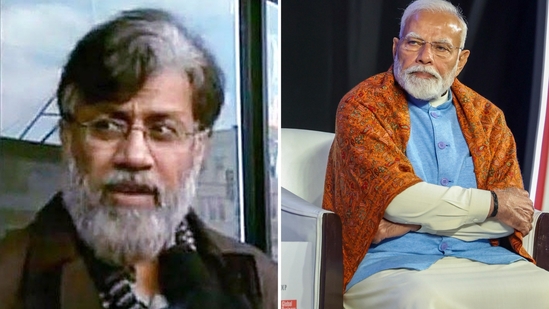The successful extradition of Tahawwur Rana from the United States has ignited widespread acclaim for Prime Minister Narendra Modi. Social media platforms are abuzz with appreciation for his relentless commitment to bringing justice. Users are hailing the move as a major diplomatic victory and a testament to PM Modi’s firm stance against terrorism.
A 14-year-old tweet by Prime Minister Narendra Modi has resurfaced and gone viral on social media following the extradition of Tahawwur Rana — a key accused in the 26/11 Mumbai terror attacks. Rana was brought back to Delhi from the United States on Thursday evening, reigniting public attention and online discussions around the historic case.
A resurfaced post from 2011, when Narendra Modi served as the Chief Minister of Gujarat, has reignited political debate. In the post, Modi sharply criticized the Congress-led UPA government, labeling a US court’s decision as a “major foreign policy setback.” The criticism came in response to the American court clearing Tahawwur Rana of direct involvement in the 2008 Mumbai terror attacks, which tragically claimed 166 lives.
Modi had condemned the UPA’s handling of the case, questioning the government’s diplomatic and strategic efforts in the aftermath of the attack. The renewed attention on this old post comes amid ongoing discussions about international cooperation and justice for the victims of the Mumbai terror attacks.
The U.S. decision to declare Tahawwur Rana innocent in the 26/11 Mumbai terror attacks is a grave insult to India’s sovereignty and marks a significant setback in our foreign policy,” Prime Minister Narendra Modi stated in a post on X (formerly Twitter).
Modi: Tahawwur Rana Extradited to India in Connection with 26/11 Mumbai Attacks
New Delhi, India – In a significant development in the 2008 Mumbai terror attacks case, Tahawwur Rana, a Canadian citizen of Pakistani origin, has been extradited to India after an extended legal battle in the United States. He arrived in Delhi on Thursday, following years of contesting his extradition on health and legal grounds.
Rana’s arrival marks a crucial step forward in India’s ongoing efforts to seek justice for the victims of the 26/11 attacks, which left 166 people dead and hundreds injured. Upon landing in Delhi, he was formally arrested by the National Investigation Agency (NIA).
A special court in Delhi granted the NIA an 18-day custody of Rana for further investigation. Authorities allege that he played a vital support role in the planning of the attacks, particularly by assisting co-conspirator David Coleman Headley in conducting surveillance of potential targets across Mumbai.
This extradition represents a major milestone in India’s decade-long pursuit of accountability in one of the most devastating terror attacks in the country’s history.
David Headley, who later turned approver in the 26/11 Mumbai terror attacks case, revealed that Tahawwur Rana played a crucial role in facilitating his operations in India. According to Headley’s testimony, Rana used his immigration consultancy firm to provide a cover identity for Headley while he traveled across Mumbai, surveying high-profile targets such as the Taj Mahal Palace Hotel, Chabad House, and the CST railway station on behalf of the terror outfit Lashkar-e-Taiba (LeT).
Investigating agencies stated that Rana was instrumental in helping Headley obtain a long-term Indian visa. He also allegedly allowed Headley to open a front office in Mumbai and maintained contact with other co-conspirators, including a Pakistani intelligence officer identified as ‘Major Iqbal’.
According to the 2023 charge sheet filed by the Mumbai Police, Rana himself traveled to India in November 2008, just days before the deadly attacks. During his stay, he checked into a hotel in Powai and reportedly held discussions about densely populated areas in South Mumbai with an individual who has since been listed as a witness in the ongoing case.
In one of the darkest chapters of modern Indian history, multiple iconic locations in Mumbai were targeted by Pakistani terrorists in a series of coordinated attacks that left 166 people dead. Among the locations attacked were the Taj Mahal Palace Hotel, Oberoi Trident, Leopold Cafe, Chabad House, and the Chhatrapati Shivaji Terminus (CST) train station — all meticulously scouted in advance by David Headley.
The Long Legal Road: India’s 16-Year Fight for Extradition
Chicago-based Canadian-Pakistani national Tahawwur Rana was first arrested in the United States in 2009 and convicted in 2011 for providing support to a terrorist organization. However, the court did not find sufficient evidence to convict him for direct involvement in the 26/11 Mumbai attacks — a verdict that sparked outrage in India, including a widely-shared and critical tweet by Prime Minister Narendra Modi.
Rana was sentenced to 14 years in prison but was released in 2020 on health grounds. Despite his release, the Indian government remained firm in its pursuit of justice. Following an official extradition request from India, Rana was re-arrested in the U.S. and eventually handed over after all his legal appeals were exhausted.
This marks a major milestone in India’s relentless quest to hold all those responsible for the 2008 Mumbai attacks accountable, regardless of where they may be.
His visit to India comes in the wake of Prime Minister Narendra Modi’s recent trip to the United States earlier this year, during which former U.S. President Donald Trump confirmed that the extradition process was already in motion.
Read Also
PM Modi Kicks Off Multiple Projects in Varanasi, Takes Swipe at Opposition















 Categories
Categories










